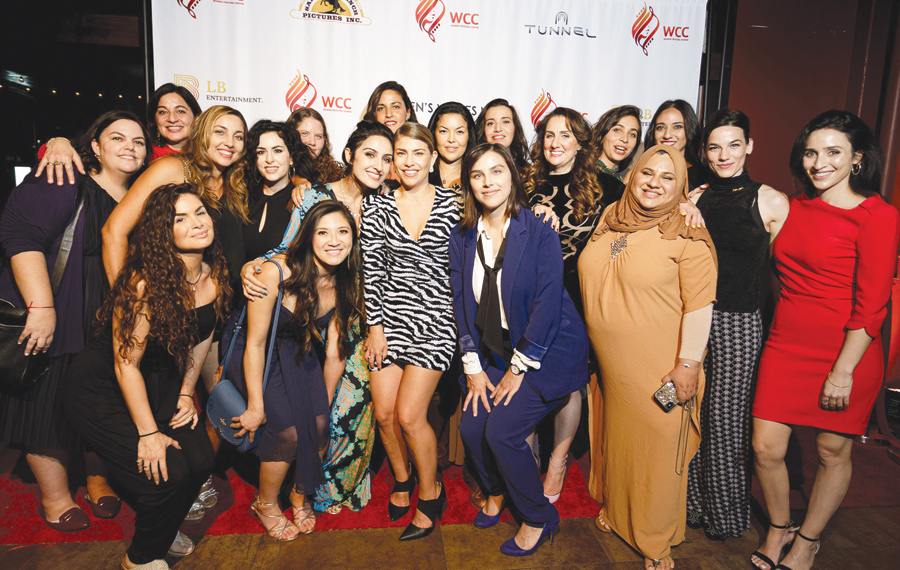 “Stand Up for Her” Benefit. Photo courtesy of LB E ntertainment
“Stand Up for Her” Benefit. Photo courtesy of LB E ntertainment The jokes rained down, spanning a multitude of subjects, many of which were ripe for laughs: dating, body image, men, crazy families and airport metal detectors. Not everything was meant to be humorous, and little was off-limits.
And when the artists and entertainers who came together on Nov. 17 for the “Stand Up for Her” benefit at Expert Dojo in Santa Monica weren’t laughing, they were crying, dancing, celebrating, dining and even ululating. Event organizers from Women Creating Change (WCC) assembled Israelis and Egyptians, Moroccans and Pakistanis, Jews and Muslims to embrace their differences and commonalities while sharing plenty of laughs in the process.
“One of the goals of the organization is to use our platform and empower women to be activists to promote good in the world,” WCC founder Lee Broda said. “So we wanted to deliver that message of inspiration and change and possibility. We wanted to curate a night that is also fun and entertaining that introduces our beautiful culture.”
Nearly three years ago, Broda, an actress, film producer and poet, founded WCC with an eye toward making a difference. Having worked in the entertainment industry primarily with men, she recognized a need to bring visibility and empowerment to women in the industry, particularly women of Middle Eastern descent. What began as a series of meetings in Broda’s home blossomed into a network of education, mentorship, workshops, screenings and other activities.
“As a community, we’ve been trying to get the word out to other Middle Eastern members of the region and also to the industry at large to bring women together to provide an environment where they can feel safe to ask questions,” said Nawal Bengholam, an actress-producer and founding board member of Women Creating Change. “Lee had this wonderful idea to bring together like-minded women.”
Broda added, “A lot of people call me naïve. They say, ‘This is Hollywood. Back home, it’s different. You think you can make a difference? I feel like, at the end, we will encourage people. Small steps can make a real difference and we can never know the effect of the ripples.”
“It’s a great time right now for us all to come together and just create, to make the world a better place not just for women artists but for all artists.”
— Amber Sandquist
WCC’s inaugural event in November 2017 was a panel discussion and workshop at Los Angeles City College. This November’s gathering was a chance to put the art and artistry on display.
For “Stand Up for Her,” which also served as WCC’s first major fundraiser, Broda gathered more than a dozen poets, comedians, storytellers and musicians. Visual artists from Syria, Iran, Pakistan and Israel displayed their work. Amber Sandquist designed special Converse shoes and donated a painted denim jacket for the raffle.
“A friend of mine told me it was about raising money for women in the arts from the Middle East and North Africa. As soon as she said that, I was hooked,” Sandquist said. “It’s a great time right now for us all to come together and just create, to make the world a better place not just for women artists but for all artists.”
“Stand Up for Her” kicked off with performers Reem Edan and Gal Macadar “clashing” over who would serve as host. “Let’s settle this like men. Meet me outside in five,” Edan said.
“Or we can settle this like women and talk about it,” replied Macadar. (The women decided to co-host.)
During her set, Edan noted that she is Muslim, Iraqi and Arabic. “The only thing scarier that being those three things in America today,” she said, “is simultaneously looking Mexican.”
Next up was Noam (“It’s not Norm”) Shuster. Shuster has a Romanian father and an Iranian mother and performs comedy in Arabic, Hebrew and English, which, she claims, “gets her into a lot of trouble” when the humor gets political and members of certain cultures don’t get the joke. One of Shuster’s comedy sets on TV had her family convinced she was proposing marriage to Saudi royalty.
Comedian Nina Kharoufeh, who performed wearing a hijab, took on different subjects. Islamophobia may be alive and well in Donald Trump’s America, but Kharoufeh noted that things were changing with an increase in Muslim doctors, lawyers and the election of congresswomen Rashida Tlaib and Ilhan Omar.
“There’s even a hijab section on porn sites,” Kharoufeh said. “All Muslims ever do is complain about never being included in anything, [saying,] ‘There’s never diversity anywhere.’ Pornhub listened. They gave us a whole section of girls who look like me.”
Writer-producer Ayser Salman read an excerpt from her book, “The Wrong End of the Table: A Mostly Comic Memoir of a Muslim Arab American Woman Just Trying to Fit In.” Having moved to America from Iraq when she was 3, Salman started kindergarten at age 6 because the counselors at her school felt she was not ready at 5 after she fainted during her entrance exam and added too many birds in the sky in her drawing sample.
“Apparently, too many birds is a sign of emotional disturbance in children,” Salman said. “I was still learning how to read from left to right instead of Arabic right to left, so I felt I was at a cultural disadvantage. I’m pulling out the race card, thank you very much.”






















 More news and opinions than at a Shabbat dinner, right in your inbox.
More news and opinions than at a Shabbat dinner, right in your inbox.